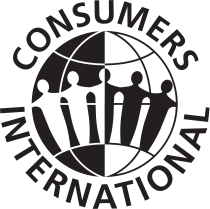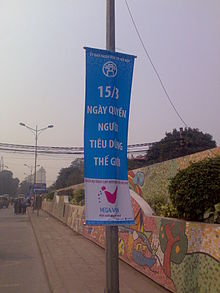- Consumers International
-
Consumers International 
Type Charity No. 1122155 Founded 1960 Location London, United Kingdom Origins Formerly the International Organisation of Consumers Unions Focus Consumer protection watchdog Method Campaigning Members 220 Website consumersinternational.org Consumers International (CI) is the world federation of consumer groups that serves as the only[citation needed] independent and authoritative global voice for consumers. It is based in London, England.
Founded on April 1, 1960, currently with over 220 member organisations in 115 countries around the world, the organisation continues to build a powerful international movement to empower and protect consumers everywhere.
In campaigning for the rights of consumers across the world, CI seeks to hold corporations to account and acts as a global watchdog against any behaviour that threatens, ignores or abuses the principles of consumer protection.
CI is a not-for-profit company limited by guarantee, company number 4337865 and registered charity number 1122155.
Contents
History
The organisation was first established in 1960 as the International Organisation of Consumers Unions (IOCU) by national consumer organisations. The original members recognised that they could build upon their individual strengths by working across national borders.
The organisation then rapidly grew and soon became established as the voice of the international consumer movement on issues such as: product and food standards, health and patients’ rights, the environment and sustainable consumption, and the regulation of international trade and public utilities.
Consumer rights
On 15 March 1962 former US President John F. Kennedy said:
Consumers by definition include us all. They are the largest economic group, affecting and affected by almost every public and private economic decision. Yet they are the only important group… whose views are often not heard.There are eight basic consumer rights which include the rights to:
- satisfaction of basic needs - to have access to basic, essential goods and services: adequate food, clothing, shelter, health care, education, public utilities, water and sanitation
- safety - to be protected against products, production processes and services which are hazardous to health or life
- information - to be given the facts needed to make an informed choice, and to be protected against dishonest or misleading advertising and labelling.
- choice - to be able to select from a range of products and services, offered at competitive prices with an assurance of satisfactory quality
- be heard - to have consumer interests represented in the making and execution of government policy, and in the development of products and services.
- redress - to receive a fair settlement of just claims, including compensation for misrepresentation, shoddy goods or unsatisfactory services.
- consumer education - to acquire knowledge and skills needed to make informed, confident choices about goods and services, while being aware of basic consumer rights and responsibilities and how to act on them.
- a healthy environment -to live and work in an environment that is non-threatening to the well being of present and future generations.
Membership
CI supports and represents over 220 member organisations in 115 countries around the world.
About two-thirds of member organisations are in developing countries, the other third in industrialised countries.
These members include a wide range of different independent consumer organisations and government organisations. Some independent member organisations are long-established, with hundreds of staff and millions of their own members, whilst others are semi-voluntary associations providing information and advice about basic services in some of the world's poorest countries.
CI also works with and hosts the Transatlantic Consumer Dialogue (TACD) - a forum of US and EU consumer organisations that develops and agrees on joint consumer policy recommendations to the US government and European Union to promote the consumer interest in EU and US policy making - at its office in London.
World Consumer Rights Day
World Consumer Rights Day (WCRD) first took place on 15 March 1983 and has since become an important occasion for mobilising citizen action, celebrating its 25th anniversary in 2008 with the launch of the Junk Food Generation campaign.
It is an annual occasion for celebration and solidarity within the international consumer movement:
- promoting the basic rights of all consumers
- demanding that those rights are respected and protected
- protesting about the market abuses and social injustices which undermine them.
Campaigns, projects and key issues
CI campaigns seek to achieve real changes in government policy and corporate behaviour, whilst raising awareness of consumer rights and responsibilities
Current campaigns, projects and key issues include:
Junk Food Generation
The campaign against the marketing of unhealthy food to children. Campaign highlights and publications include:
- Left wanting more
- New media, same old tricks
- Cereal offences
- The junk food trap
- International Code on the marketing of food and non-alcoholic beverages to children
- World Consumer Rights Day 2008 and 2009
Marketing Overdose
The campaign against the unethical promotion of drugs. Campaign highlights and publications include:
- Drugs, doctors and dinners
- Branding the cure
- World Consumer Rights Day 2007
Access to knowledge (A2K)
This project facilitates the global consumer dialogue and education network about Access to Knowledge (A2K). Project highlights and publications include:
- Launch of the Intellectually Property (IP) Watch List - a global snapshot of how IP and copyright laws serve or subvert consumer interests
Financial crisis – Consumer solutions to the financial fix
Issue progress includes:
- Submission of a position paper to the OECD Committee for Consumer Policy for its discussion on the strategic response to the global financial and economic crisis.
- Submission to the UN General Assembly on Reforms of International Monetary and Financial system.
Corporate social responsibility and standards
CI has represented consumers on many committees of the International Organisation for Standardisation (ISO) through the years. Current participation at the ISO includes:
- Working towards ISO 26000 - a new standard that is very important because it will set out how organisations, which claim they are socially responsible in their working practices, give feedback to consumers.
The Real Deal
This series of features highlight unethical and unsustainable behaviour by corporations and governments, as part of CI's ongoing work on sustainable consumption. Features include:
- Check this out before you check in… exposing the unethical behaviour of international hotel chains
- e-waste: West Africa continues to drown in the rich world’s obsolete electronics
- The hidden cost of mobile phones
- Just coffee
Offices
CI has four offices in:
External links
Categories:- Consumer organizations
- International organizations
Wikimedia Foundation. 2010.

